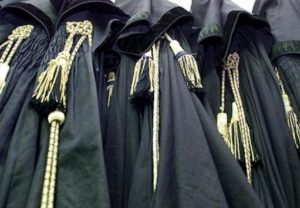THE STORY
Two lawyers were acting on an admonitory against a customer, in order to recover its professional credit in relation to the activities, amounting to about 27 EUR thousand.
The debtor appealed against the injunction, raising the objection of limitation.
The trial court upheld the opposition and declared prescribed credit, while the lawyers were challenging the decision.
The Supreme Court, then, It has to answer the following question: since the limitation period three presumptive for claims professionals ?
 PREMISE: PRESCRIPTION PRESUMPTIVE
PREMISE: PRESCRIPTION PRESUMPTIVE
Before considering the merits of the matter, and the story that preceded the decision of the judge of legitimacy, it should precede brief overview of what is meant by "prescription presumptive".
Well, First we must distinguish between prescription extinctive, namely that related to the failure to exercise the right for a given time established by the law (art. 2932 c.c.) and prescription presumptive founded, the usual, on the presumption that that claim has been paid or allowed to lapse for other reasons, in terms (6 months, 1 e 3 years) according to law.
The difference consists in the fact that the second type of prescription is based on a rebuttable presumption, that can be won by showing the opposite.
The debtor is relieved from the burden to prove that they have complied, while it is attached to the creditor that the service was not effected.
this requirement, then, It does not operate on the substantive law, but on the procedural. To win the praesumptio is is not brought about any means of proof, but you can use only the judicial confession (art. 2959 c.c.) and the referral for decisive oath (art. 2960 c.c.).
Moreover, "Presumptive prescribing is not based on the inertia of the creditor and the passage of time - as is the ordinary prescription - but on the presumption that, given the nature of obligation and uses, the payment was made within the prescribed period ' (Cass. 15303/2019).
For this reason, the prescription exception must be rejected if the debtor admits to not having paid, since the non-payment is inconsistent with the requirements of the presumption itself.
PRESUMPTIVE PRESCRIPTION FOR PROFESSIONAL CREDITS
Given the above, the right professional for the work paid compensation and reimbursement of expenses correlative (art. 2956 n. 2 c.c.) It is prescribed in 3 years.
For the case-law, in the category of professionals subject to prescription presumptive include those exercising "an intellectual profession of ancient or recent tradition against whom the apparent assumption of the payment practices without delay […]» (Cass. 3886/1985).
The limitation on the right to lawyer's remuneration does not work if the claim stems from a contract in writing.
Indeed, prescription presumptive reason is only in relationships that take place without formality, where the payment is made without delay (Cass. 763/2017; Cass. 9930/2014).
THE EFFECT OF THE PRESCRIPTION PRESUMPTIVE
The general rule concerning the effect of the presumptive prescription (art. 2957, 1°co, c.c.) It provides that it shall run: (A) the expiry of the regular salary (for job providers), or (B) the performance of the service (for professionals).
There is also a special rule, Notwithstanding that the above-mentioned general, in relation to the presumptive prescription for lawyers' skills (art. 2957, 2°co, c.c.), according to which it runs: (A) the decision of the dispute, coinciding with the publication of the non-appealable final judgment in the judgment (Cass. 12326/2001); (B) the conciliation of the parties, coinciding with the date of ratification by conciliation; (C) the cancellation of appointment; (D) the last performance in the case of unfinished business.
Essentially, the principle obtainable from the second paragraph of Article 2957 c.c. It is that the limitation period runs from exhaustion assignment and not by the performance of individual services.
However, back to operate the general rule mentioned in the first paragraph of Article 2957 c.c. - ie the effect from completion of the service - even if the lawyer's remuneration, if the office to the trader is limited to particular performance, they are in immediate and direct relationship with the dispute decision.
In such a circumstance, the period runs from the completion of the individual asset (Cass. 9221/1992). If you think, for example, to the case where the required task to legal concerns the proposition of a notice of appeal, with exclusion of the provision it may be necessary after the said act.
Well, then, do not fall in the specific case of the special rule, It will apply the general rule under art. 2957, 1°co, c.c.
 PERFORMANCE OF INTELLECTUAL WORK AND PRESCRIPTION
PERFORMANCE OF INTELLECTUAL WORK AND PRESCRIPTION
The activity carried out by the lawyer is part of an intellectual work contract contract. For the purposes of the running of the limitation, the said contract shall be considered only, although its fulfillment is articles in a plurality of performance.
The uniqueness of the service makes the three-year limitation period - relating to the right to compensation - it runs from the day it was completed the task, and not by the performance of each professional operation covered in the contract (Cass. 22868/2014). summing up, prescription 3 years to the lawyer's credit begins: (A) the fulfillment of the function; (B) from the moment the contract ceases to explain its effects; (C) when it ceases the relationship with the customer, Also for the latter's death (Cass. 72812012, Cass. 18808/2015); (D) for the prosecutor's death or termination of the profession? (Cass. 965/1964).
WHILE THE ASSIGNMENT
Before analyzing the pronunciation, we remember that, in the present case, the two lawyers have formulated its credit required for the work done until June 1998, while the overall activity loaned to the customers expanded from May 1996 March 2003, given the latter where the woman withdrew the mandate.
Then, the lawyers who acted for the recovery of professional credits up to a certain date (June 1998) and from that moment it is (from them) made after the limitation period.
Supreme Court, with the ordinance in question, states that, if the lender sues for payment of fees, in relation to the tasks executed up to a certain date, this date may be taken as a quo dies of the limitation period, after confirming that the professional assignment was exhausted with the fulfillment of the performance object of demand.
In light of the foregoing, It shows how important it is to clarify whether the activity that was carried by the lender (I our case, lawyers) He has exhausted the task.
Indeed, prescription, regarding attorney fees, begins exhaustion assignment and not by the performance of individual services.
CONCLUSIONS
In the present case, the trial court ascertain the above does not work and has not made a specific "investigation" to determine whether the services for which you asked for payment have exhausted the task.
A similar analysis was essential given that the work done by professionals in favor of the customer embraced a broad time span (from May 1996 March 2003).
For this reason, the Supreme Court, welcomes the first plea in the action carried out by lawyers and case the judgment under appeal, ruling that the national court must adhere to the following principle of law: "Laid down the principle, obtainable by art. 2957 c.c., comma 2, that in matters of attorney fees shall begin to run not by the performance of individual services, but exhaustion assignment, if it was asked in court the payment of professional fees as a lawyer for services rendered up to a certain date, this date may be taken as the starting point of the limitation period does not automatically, as a result of mere temporal delimitation of the claim made by the creditor, but only following a finding that the professional assignment was exhausted with the fulfillment of the subject of the application benefits'.